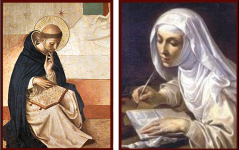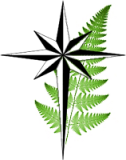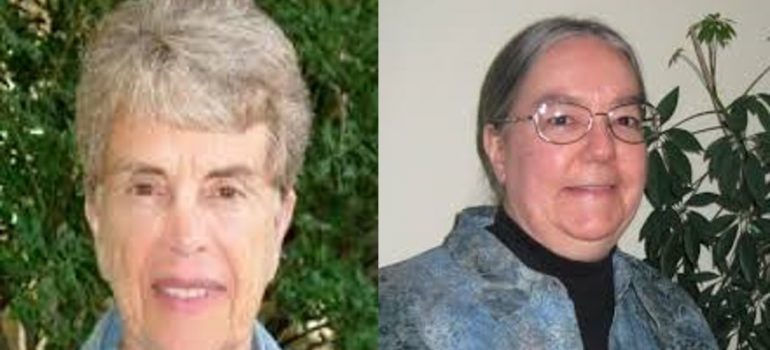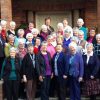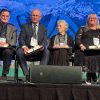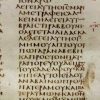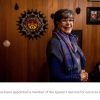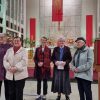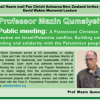At a presentation in Auckland on 9 March, Margaret Galiardi OP and Sharon Zayac OP asked the question how do we go beyond Laudato Si? It’s a challenging question… many of us would admit that we haven’t fully read this important document and others who have read it might say that they are still coming to a full understanding of the document. So how can we possible go beyond Laudato Si? What is the next stage in the evolution of the planet? What is the next stage in human consciousness? How do we move from a narrow bandwidth by which we are only concerned about ourselves, our own countries to be concerned about life in totality on this planet and a sense of wonder for the whole universe?
We were encouraged to become one with ALL that is – to recognise that we are the light. If we are to create a new culture that Pope Francis is asking of us the first step must be intentional silence. This is a time when we sit without words, without conversation between ourselves and God … without even waiting for God to tell us something. We need silence to find a sense of oneness with the entire universe.
John Mayne (Benediction Monk): “As each of us comes closer to Christ, the whole fabric of human consciousness is knit more closely together. As we deepen our spiritual journey we see that this is not just a personal matter, it partakes of a responsibility of the whole human race and indeed the whole of creation.”
This contemplative time connects us as individual to all that is human, all that is alive in our universe. John Mayne continues: ´When we sit in silence in this manner we are connecting with the divine. We are connecting with the source of all that is. We are connected to everything that is. The more deeply that we enter into the Mystery, the more truly human and humane we become. Our personal commitment to meditation and the spiritual journey is a commitment to the whole of creation.” “
We watched a video “Awakening the Universe” about cosmology and the ongoing unfolding of the universe and the role of the human in that unfolding. A few of the observations from people in the room after watching the video:
- We came out of the earth rather than that we have been added to the earth
- We are in the midst of a mass extinction
- It is the impact of humans that is literally destroying our planetary systems
- Why would we destroy the system that we rely on?
Our presenters asked the question “how do we orient ourselves for the future?
- Reconnect ourselves with nature
- The earth has evolved over a very long time but it is coming to a rapid end – time is of the essence – we are at a cross roads
- We need to see ourselves as part of nature. We are human nature. We are one with the home.
- Genesis: Lord it over creation. Care for the earth as I God care for the earth “
- Be in union with God and creation
- God, science and religion can enrich one another
- We are perpetrators, victims and the accuser (three roles). Consciousness is an awareness of the need for action.
We lack an awareness of
- Our common origin
- Our mutual belonging
- A future to be shared by all
A great spiritual cultural and educational challenge stands before us. Set out on the long path of renewal. Laudato Si is not a document that we can read once, do some work on and put down as done. At the end of the document Pope Francis takes us back to the beginning of the document – to the purpose of the document – to turn what is happening to the world into our own personal suffering and thus discover what we have to do about it. The Pope is asking us to create a new culture.
There are both horizontal and vertical dimensions – we are no longer Americans or Africans or Indians OR democrats or members of the labour party. We are no longer small identities. What we are is earthlings. That is the horizontal dimension of the planet. The vertical dimension that it is only by going more and more deeply into the identity as earthlings that the planet will have a future and that all life on the planet will thrive. It is a new consciousness. It is a consciousness that is global, trans-cultural and integral. It is both individual and also has a tension to be social. It moves beyond the highly individual way of thinking. It moves beyond “I am right and everybody else is wrong” Sin today is refusing to step up to the plate and refusing to take responsibility for the next step.
In the presentation we were asked to consider two sources of wisdom (ch 2 of Laudato Si)
- Science
- Religions (note the plural) – we need the diversity of cultures to make us fully human.
No branch of the sciences and no form of wisdom can be left out. Science reveals the what and the how to us. This is essential to understand Who are we? We are made in the image and likeness of God .. Christian and Jewish scholars are telling us that Genesis teaches us that being made in God’s image and likeness does not mean that we look like God. What we have done is make God look like us. God took the “clay of earth” and “creature of earth”. Adam is not the name of a man but the creature formed from the clay of earth – literally the earth-ling. (adamah means clay of Earth | Adam means creature of Earth). We are called to act like God – God’s desire is for life, beauty. We have interpreted the word to have dominion to be domination – this means to be “blessing” to earth. Being made in God’s image we are have dominion/blessing to creation of which we are part.
Whatever one member of the household does affects the whole of the house. We were formed from planet earth. Literally we evolved out of the life of the planet. We have reflective consciousness – this is perhaps what it means to say that we are made in the image and likeness of God. We can share across faiths, across time, through writing poetry and art, – we reflect what we see, hear and understand.
Science tells us that the earth has been evolving about 4.5 billion years ago. Life has been evolving on earth and eventually after 4.5 billion years – earth birthed us as a human. What does this really mean for us? We are the earth creatures (the adam) that holds a responsibility that no other species has in the history of the earth? Now because of our numbers and our growth, we have become the most powerful species in the history of this planet. We have the capacity to decide how mother earth will evolve and even whether or not she will. We heard quotes:
Elizabeth Johnson: Whenever there is a growth spurt in science there is a corresponding growth spurt in theology. Theology is reflecting on God and all things in light of God. There is a mirror like relationship between the creator God and God’s creation.
Thomas Aquinas: A mistake in understanding creation will undoubtedly lead to a mistake in understanding God.
We were challenged by some metaphors: (not to be taken literally!) If you push it too far you will distort reality
- Creator of Self Creating universe. Who is the God who creates a self-creating universe?
- God as creator of all, here with us now, pouring God’s self out in love. At the end of the 7th day God rested. We walked away with the impression that creation was finished. Creation is one long act that continues.
- God as Divine Far-Nearness – points to the mystery of the divine. The closeness of God and the beyondness of God. When hiking the presence of God is so close that it jumps into transcendence – that which cannot be contained
- Womb of the Universe – Abyss God – – that material of life.
- Fecund Emptiness
- Love seeking to manifest. In Laudato Si Pope Francis speaks of the universe unfolds in God who fills it completely. The universe cannot contain God but God fills the universe. God is everywhere. We don’t really act that way. What Pope Francis is saying is that God is here. God becomes flesh in every star, galaxy, fin, claw, child …. God as love seeking to manifest.
- The Christian Experience of God as multifaceted – the living God is an overflowing communion of self-giving love. They are what they are in relation to each other. Metaphor for the Trinity.
- In the beginning was God and then God said ‘Let Other Be’… and there was other in God.
This presentation covered so much more, we hope that some of the ideas shared in this short reflection will provoke reflection and dialogue. Margaret Galiardi OP and Sharon Zayac OP are speaking throughout Aotearoa New Zealand during March. For more details click the link below.
